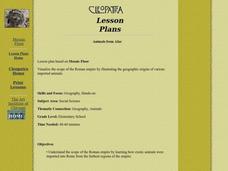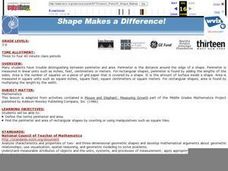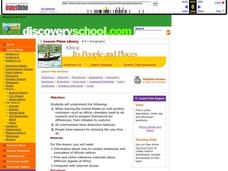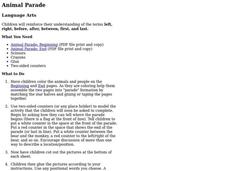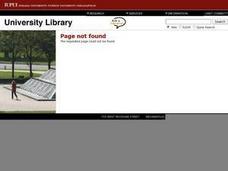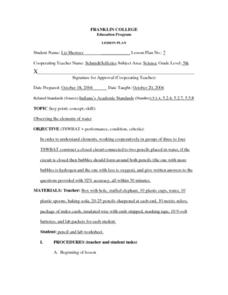Curated OER
Using Commas to Write Lists
In this commas in lists worksheet, students examine 3 labeled pictures and the name of someone who bought the items. Students write a sentence with commas in a list. Students then insert commas in 10 sentences with lists. There are no...
Curated OER
A or An
In this word choice activity, students read the sentences and select whether to use the article adjective a or an for each sentence. Students complete 20 sentences.
Curated OER
Which Kind of Sentence
In this type of sentences worksheet, students read each sentence and write the correct punctuation at the end of the sentence. Students review examples for declarative and interrogative sentence endings. Students complete 10 sentences.
Curated OER
Learning About Mammals
Students study the mammal classification and forms of them living in the United States. In this mammal study lesson, students read through orders of mammals that exist in the United States. Students also study the taxonomy of an eastern...
Curated OER
Animals from Afar
Pupils visualize the scope of the Roman empire by illustrating the geographic origins of various imported animals. They study how exotic animals were imported into Rome from the farthest regions of the empire.
Curated OER
Relative Size: Big and Little
Students work with big and little objects by placing objects in order small to large, and by completing a worksheet.
Curated OER
"If You Hopped Like a Frog" by David M. Schwartz
Learners brainstorm several animal/personal scenarios, select one, and write out an explanation of the comparison. They apply the measurements/characteristics to themselves and use algebraic equations to demonstrate the comparison.
Curated OER
What Animals Eat
First graders organize animals according to what they eat. They compare the teeth of plant eaters and meat eaters.
Curated OER
Adapting to Animal Behavior for Survival
Second graders explore animal behaviors and adaptations by researching several different animals and their habitats.
Curated OER
"Home Sweet Home?"
Pupils research an endangered animal's habitat, investigate the survival problems. They research the animal's zoo life. They research some programs of reintroduction and chart the pros and cons of each.
Curated OER
Shape Makes a Difference!
Students learn the difference between perimeter and area by watching a video and a hands on activity.
Curated OER
Endangered Animals Report
Fifth graders research an endangered animal and create a written and technological report. Students present their slide show report to the class. The class completes a rubric for each student presentation.
Curated OER
Aspects of Participatory Citizenship
Students research the current issues about the government of Canada and develop their presentation skills.
Curated OER
Palpating Pachyderms: How Do We Interpret Observations?
Learners interpret a poem before completing activities to distinguish observations and interpretations. They examine how personal background can influence how a person interpreters what they observe.
Curated OER
Wildlife Preservers
Students research endangered animal species and how they might be preserved by writing speeches to present to classmates.
Curated OER
Partners in Nature
Students role-play how animals and plants depend on and help each other in symbiotic relationships. Working in pairs, they role-play the animals' relationship. They may also choose to draw pictures of these partnerships.
Curated OER
Animal Parade
Students begin the activity by coloring animals on the beginning and end pages. They are to put the other pages in order based on the animals place in the parade.
Curated OER
Build a Bug
Students design an ideally adapted macroinvertebrate to live in a water habitat. They illustrate their animal, name it and specify the adaptations it has that enable it to survive.
Curated OER
Meet a Creature From Ancient China
Students view an image of a Chinese chimera and complete a chart describing what they see and understand about the creature. They compare funerary customs today to those of ancient China. They compile a list of items that might be...
Curated OER
Connections
Students examine the interdependence of the West Central African forest ecosystem. They draw pictures of items found in this ecosystem, discuss their interdependence, and answer discussion questions.
Curated OER
Studies of the Eastern Worlds: Population Graphing
Seventh graders participate in several learning/research stations in which they view artwork from various countries of the Eastern world and collect information on the populations of the Eastern countries. They then use this information...
Curated OER
Observing the Elements of Water
Fifth graders conduct a closed circuit experiment to observe the elements of water. They discuss the elements of Hydrogen and Oxygen, and in small groups construct a closed circuit connected to two pencils placed in water. Students...
Curated OER
Number Families
First graders examine the relationship between numbers and number families. They listen to the poem "Kangaroo and Toad" by Shel Silverstein and create a list of the largest animals they can think of. Students then order the animals...
Curated OER
Point of View and Scientific Truth
Students investigate the mystery of the "destructive force." They explore the concepts of natural phenomena. Students discuss the limited aspects of natural phenomena and the "whole truth" to generate new hypotheses that can be tested.
Other popular searches
- Elephants Elmer
- Elephant Seal Food Chain
- Elmer the Elephant
- African Elephants
- Shooting an Elephant
- Animal Rights and Elephants
- Hills Like White Elephants
- Elephant Crossword
- Asian Elephants
- Elephant Toothpaste
- Elephant Word Search
- Elephant Seals




